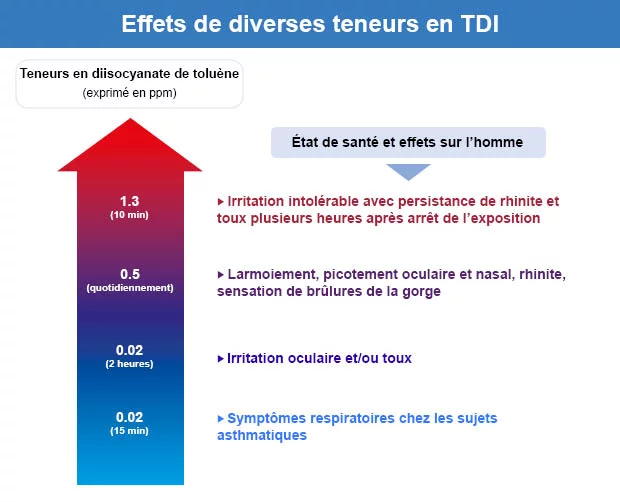This page brings together the main information on aromatic isocyanates, more precisely Toluene Diisocyanate (TDI) and Diphenylmethane Diisocyanate (MDI), their physical characteristics, their effects on health, the means of detecting them (aromatic isocyanate gas detector) as well as the appropriate respiratory protection equipment (gas mask or assisted ventilation device with combined filter type E-P2 ).
Aromatic isocyanates are currently used in the synthesis of polyurethanes. Toluene diisocyanate, also known as TDI, is mainly used in the manufacture of flexible padding foams. Diphenylmethane diisocyanate, also known as MDI, is useful in the production of rigid foams used for insulation and can also be used as a binder in foundries.
TDI (Toluene diisocyanate) is a colorless or pale yellow liquid with a pungent, penetrating odor that is detectable at low concentrations (1 to 2 ppm). 4,4'-MDI (Diphenylmethane diisocyanate) is white or pale yellow crystals with a slight musty odor.
Acute exposure to TDI and MDI isocyanates causes damage to the respiratory mucous membranes that can be serious. Skin and eye irritation can also be particularly significant. Chronic exposure to TDI can cause occupational asthma, as well as an accelerated decline in respiratory function. Repeated exposure to MDI results in allergic manifestations: eczema, asthma, hypersensitivity pneumonitis, conjunctivitis.

After short exposure but at high concentrations, MDI can cause reactions that may not appear until a few hours later: irritation of the mucous membranes (conjunctivitis, rhinitis, pharyngitis, nausea, vomiting), skin irritation, pulmonary irritation (chest pain, cough, etc.), neurological disorders (dizziness, balance and consciousness disorders, headaches) and in the most serious cases pulmonary edema.
In the event of repeated exposure to low concentrations of MDI, reactions may appear a few weeks to several years later: contact eczema, allergic asthma or even hypersensitivity pneumonitis.
Few devices are available to detect aromatic isocyanates : passive sampling badges to be worn by employees or a much more complex (expensive) optical gas analysis device.
Since isocyanates are highly irritating to the eyes and respiratory tract, a full-face mask should be used for short-term interventions or in rooms with low gas concentrations, or a powered ventilation device (more comfortable), with combined A2B2-P3 filters for TDI or A-P3 for MDI . In the event of emergency interventions, a self-contained breathing apparatus will be essential.
check_circle
check_circle
Nous utilisons des cookies tiers pour améliorer votre expérience de navigation, analyser le trafic du site et personnaliser le contenu et les publicités. En savoir plus